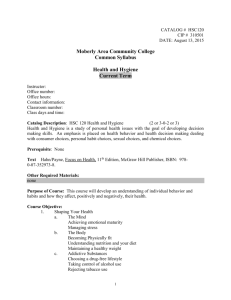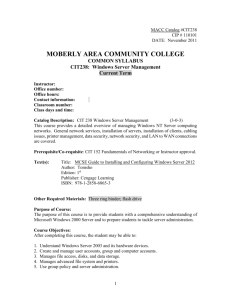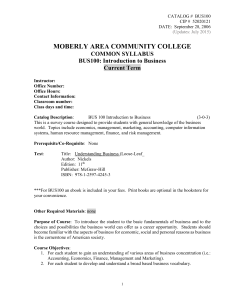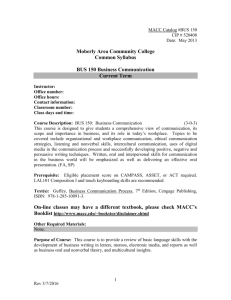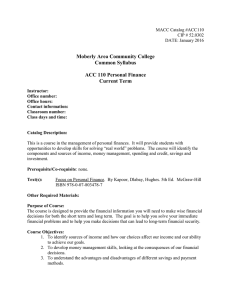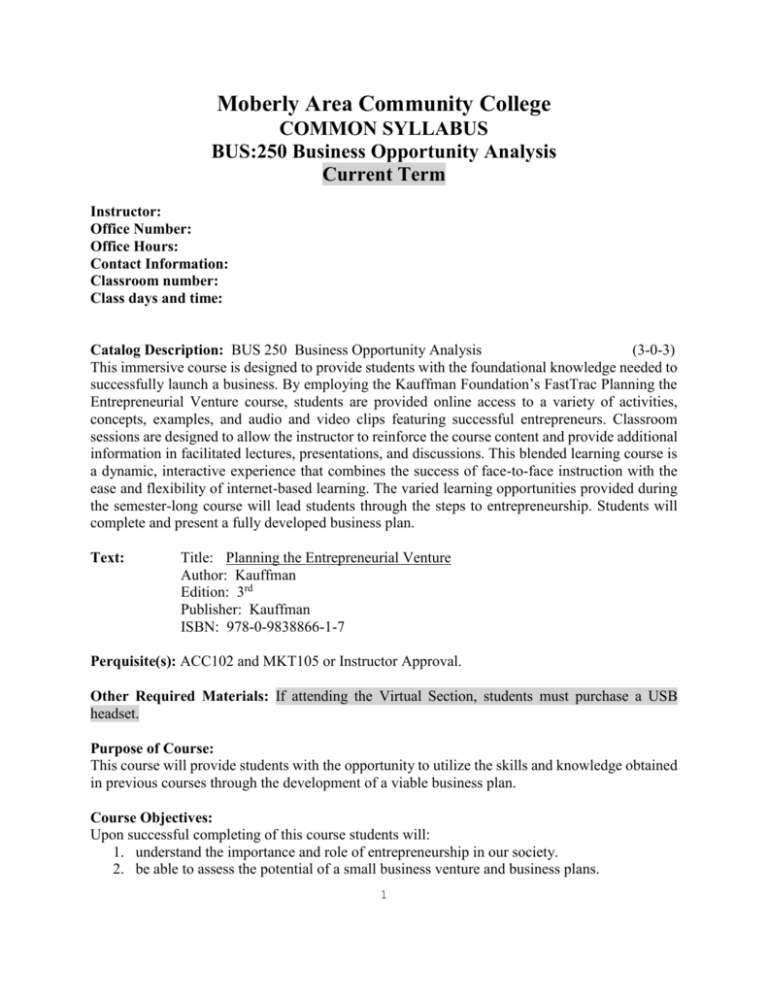
Moberly Area Community College
COMMON SYLLABUS
BUS:250 Business Opportunity Analysis
Current Term
Instructor:
Office Number:
Office Hours:
Contact Information:
Classroom number:
Class days and time:
Catalog Description: BUS 250 Business Opportunity Analysis
(3-0-3)
This immersive course is designed to provide students with the foundational knowledge needed to
successfully launch a business. By employing the Kauffman Foundation’s FastTrac Planning the
Entrepreneurial Venture course, students are provided online access to a variety of activities,
concepts, examples, and audio and video clips featuring successful entrepreneurs. Classroom
sessions are designed to allow the instructor to reinforce the course content and provide additional
information in facilitated lectures, presentations, and discussions. This blended learning course is
a dynamic, interactive experience that combines the success of face-to-face instruction with the
ease and flexibility of internet-based learning. The varied learning opportunities provided during
the semester-long course will lead students through the steps to entrepreneurship. Students will
complete and present a fully developed business plan.
Text:
Title: Planning the Entrepreneurial Venture
Author: Kauffman
Edition: 3rd
Publisher: Kauffman
ISBN: 978-0-9838866-1-7
Perquisite(s): ACC102 and MKT105 or Instructor Approval.
Other Required Materials: If attending the Virtual Section, students must purchase a USB
headset.
Purpose of Course:
This course will provide students with the opportunity to utilize the skills and knowledge obtained
in previous courses through the development of a viable business plan.
Course Objectives:
Upon successful completing of this course students will:
1. understand the importance and role of entrepreneurship in our society.
2. be able to assess the potential of a small business venture and business plans.
1
3. demonstrate the ability to take a new venture idea and effectively communicate that idea
through the development of a written business plan and oral presentation.
4. understand how the various aspects of marketing and management (business) interact to
form a viable business venture.
Course Content:
The role of entrepreneurship in an economic unit has been well documented and is of interest to
businesspeople, politicians, and university professors and students. Creating and growing a new
venture inside or outside the corporation is a task that few individuals are able to accomplish, even
though many profess the desire. This course is based on an understanding of all the functional
areas of business and applies the tools and analytical techniques of these functional areas to the
new venture creation process. Participants will study the rewards and challenges of
entrepreneurship from the conception of the idea through marketing, customer identification, and
financing, to management practices necessary for success. Students will complete and present a
fully-developed business plan.
“Statement to Connect Course with General Education Outcomes or Technical Education
Program Objectives:”
In compliance with MACC’s Marketing/Management Program Assessment Plan, the student who
successfully completes this course will be able to meet the following Program Objectives:
1. Be able to effectively communicate both orally and in writing in a variety of business
settings.
2. Be able to demonstrate basic interpersonal communication skills.
3. Be able to identify general principles of human behavior.
4. Be able to demonstrate the ability to prepare and deliver a professional business
presentation using appropriate visual aids.
5. Be able to demonstrate a basic understanding of computer software used in business.
6. Be able to effectively work in small groups.
7. Understand the function of marketing in the free enterprise system.
8. Be able to develop an effective marketing mix.
9. Be able to perform effective problem solving in a variety of business settings.
10. Understand human resource techniques used in today’s business environment.
11. Be able to define and engage in the four functions of management.
12. Be able to lead and motivate themselves and others in an organizational setting.
13. Be able to prepare, evaluate, and interpret a business plan. Understanding the importance
and interaction of each aspect (i.e. accounting, marketing, finance, management, etc.)to
form a successful business enterprise.
14. Be able to prepare and evaluate advertising strategies, objectives, and tactics and have an
understanding of the role advertising plays in society.
Assessment of Student Learning:
Grading: Grades will be issued according to the following scale:
A = 90% - 100%
B = 80% - 89%
2
C = 70% - 79%
D = 60% - 69%
F = 59% - & below
Business Administration Program Assessment: The Business Administration faculty
continually strive to meet the needs of their students through program improvements. These
improvements are a result of program assessments and the consultation and advisement of the
Business Administration Advisory Committee. In addition to the course assessments outlined in
this syllabus, the objectives achieved in this course will also be an integral part of the BA
program assessment.
Instructor Policies:
Attendance:
Any student who misses two consecutive weeks of class during a regular sixteen-week semester
or the equivalent proportion of class time during a shorter session will be dropped from the class
by the instructor unless acceptable justification is supplied. Additionally, any student who misses
more than one-fourth of the entire number of in-seat class meetings in a regular 16-week semester
or the equivalent proportion of class time during a shorter session, may be dropped from that class
by the instructor if, in the opinion of the instructor, the student does not have reasonable
opportunity to succeed in the class.
Student attendance must be defined in a different manner for online, hybrid, and virtual courses.
Student attendance in these courses is defined as active participation in the course. Online, hybrid,
and virtual courses will, at a minimum, have weekly mechanisms for student participation, such
as any or all of the following methods:
a. Completion of quizzes or exams
b. Submission of assignments
c. Participation in threaded discussions
d. Communication with the instructor
A student who does not participate in an online, hybrid, or virtual course for two consecutive weeks
will be dropped by the instructor unless acceptable justification is supplied. (Policy Handbook,
I.090)
Tardiness: per instructor’s policy
Make-up and late work: per instructor’s policy
Extra-Credit: per instructor’s policy
ADA Statement
Students who have disabilities that qualify under the Americans with Disabilities Act may
register for assistance through the Office of Access and ADA Services. Students are invited to
contact the Access Office to confidentially discuss disability information, academic
3
accommodations, appropriate documentation and procedures. For more information, please call
either the Moberly office at (660) 263-4100 x 11240 or the Columbia office at (573) 234-1067 x
12120, or visit our web page at http://www.macc.edu/index.php/services/access-office.
Title IX Statement
MACC maintains a strict policy prohibiting sexual misconduct in any form, including sexual
harassment, sexual discrimination, and sexual violence. All MACC employees, including faculty
members, are considered mandated reporters of sexual misconduct and as such are expected to
contact the Title IX Coordinator when they become aware, in conversation or in writing, of an
incident of sexual misconduct. For more information on this policy or to learn about support
resources, please see http://www.macc.edu/sexual-misconduct-policy or contact Dr. Jackie
Fischer, MACC’s Title IX Coordinator, at 660-263-4110, ext. 11236 or jackief@macc.edu.
Academic Dishonesty:
MACC board policy is as follows: “Academic dishonesty by students damages institutional
credibility and unfairly jeopardizes honest students; therefore, it will not be tolerated in any
form.” Forms of academic dishonesty include but are not limited to the following: violations of
copyright law, plagiarism, fabrication, cheating, collusion, and other academic misconduct.
Incidents of dishonesty regarding assignments, examinations, classroom/laboratory
activities,and/or the submission of misleading or false information to the College will be treated
seriously. The procedure for handling academic dishonesty is outlined in the Student Handbook
(Policy Handbook M.010). In cases of alleged academic dishonesty, the burden of proof is on
the student, not on the instructor.
4


